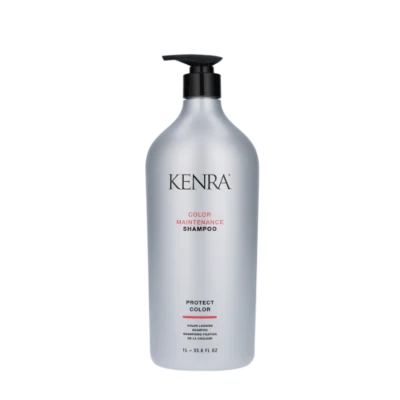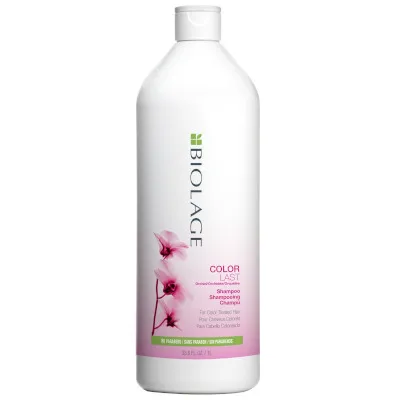
Kenra vs Biolage (The Definitive Guide)
If you're a fellow color-treated hair warrior, you know the struggle is real when it comes to finding the perfect shampoo to keep your color looking fresh and vibrant for as long as possible.
This brings us to our big comparison today: Kenra Color Maintenance Shampoo vs. Biolage Color Last Shampoo (don't worry, we also mention the conditioners towards the end). These two are pretty famous in the haircare world, so let's dive in and see how they match up.
This post contains affiliate links; as an Amazon Associate we earn commission from qualifying purchases.
Kenra Color Maintenance vs Biolage Color Last
Color Preservation
To keep your color looking fabulous, both these shampoos claim to have superior color protection. Kenra takes the lead with its impressive 67% color maintenance between services and boldly protects your color for up to 35 washes. Biolage, however, is not far behind, with a promise of up to 20 washes of color protection and maintaining salon-vibrant color for up to 9 weeks.
Ingredients
The first thing to note ingredients-wise is that both Kenra and Biolage feature Sodium Laureth Sulfate (SLES) and Cocamidopropyl Betaine (coco betaine) in their ingredient lists. SLES is a common ingredient in many shampoos; it's a surfactant, which means it's responsible for the lathering, cleaning, and degreasing effects. It's a bit controversial due to concerns about skin irritation, but in moderate concentrations and rinse-off products, it's generally considered safe (and certainly better than the more common Sodium Lauryl Sulfate - SLS).
Cocamidopropyl Betaine is another surfactant derived from coconut oil. It helps to soften the skin and hair, and it also boosts the foam-producing properties of the shampoo. It's considered to be a milder alternative to other surfactants and is generally well-tolerated, even for more sensitive skin types.
Now, let's look at Kenra's unique ingredients. A standout is the Tocopheryl Acetate, a form of Vitamin E. It's a potent antioxidant that helps to protect your hair from environmental damage like air pollution and UV radiation. This ingredient can also help to keep your hair looking shiny and smooth.
Switching to Biolage, their key ingredients include Fig and Orchid Extracts. Fig is high in Vitamin A and E, which provide nourishment to the hair, and antioxidants that help combat oxidative stress. Orchid extract is known for its reparative and protective properties. It helps to prevent breakage, adds shine, and due to its flavonoids, it could potentially prolong color vibrancy.
If you hadn't caught on already, the key to a good color-protective shampoo is antioxidants. Antioxidants are like little superheroes for your hair, fighting off the bad guys that want to mess with your melanin - the stuff that gives your hair its color. By doing so, they help your color stick around longer and keep your hair looking and feeling its best.
It's also worth mentioning that both shampoos are paraben-free. Parabens are a group of synthetic compounds used as preservatives in many cosmetic products. While the scientific community is still debating their safety, some people prefer to avoid them out of caution.
pH Balance and Hair Health
Kenra's pH-balancing system is designed to lock in color for long-lasting vibrancy, while Biolage's low pH shampoo also aims to prolong color vibrancy. Both work hard to keep your hair's pH levels in check, which is essential for maintaining color and overall hair health.
Animal Testing
Biolage gets a high five for being certified cruelty-free under the Leaping Bunny Program, an important factor for many of us these days. Kenra doesn't make any specific claims regarding animal testing directly on their product pages (as far as we could see), but their products are PETA-certified.
The Verdict
Both shampoos are formidable contenders in the color-care category, but the choice between the two ultimately comes down to your specific hair needs and values.
Kenra stands out with its commitment to color preservation, boasting up to 35 washes of color protection. Moreover, its unique blend of Tocopheryl Acetate and Blueberry Fruit Extract, both potent antioxidants, work to safeguard your hair from environmental aggressors and free radicals. This could be a game-changer if you're frequently exposed to pollution or UV rays.
In contrast, Biolage's strength lies in its nourishing and reparative benefits. Its formulas include Fig and Orchid extracts, offering a nutrient-rich treatment for your hair while also helping to repair any damage. Plus, Biolage's dedication to vegan and eco-friendly practices is noteworthy for the eco-conscious among us.
Oh, and when considering the conditioners from both brands, you'll find the similarities and differences mirror those of the shampoos quite closely.
Both brand's conditioners are designed to complement their respective shampoos, enhancing color protection, maintaining hair health, and incorporating the same high-quality ingredients. So, if you're drawn to one shampoo over the other, it's likely you'll feel the same about the corresponding conditioner!
So, if you were leaning towards Kenra's shampoo, you'll most likely prefer the Kenra Color Maintenance Conditioner. Likewise, if you preferred Biolage's shampoo, you'll probably prefer the Biolage Color Last Conditioner.
Other Kenra Ranges
For fine to medium hair:
Try Volumizing
For dry hair:
Try Moisturizing
For dull hair:
Try Clarifying
Other Biolage Ranges
For very dry hair:
Try Ultra Hydra Source
For fine hair:
Try Volume Bloom
For oily hair:
Try Scalp Sync
Related articles
Kenra vs Redken (The Definitive Guide)
Biolage vs Redken 2023 (The Definitive Guide)
Biotera vs Biolage 2023 (The Definitive Guide)
Joico vs Biolage 2023 (The Definitive Guide)
Nexxus vs Biolage 2023 (The Definitive Guide)
Paul Mitchell vs Biolage 2023 (The Definitive Guide)
BioSilk vs Biolage (The Definitive Guide)
Read more
Kenra vs Joico (The Definitive Guide)
Kenra vs Pureology (The Definitive Guide)
Calum Torrington is the founder of FemmeNordic. He has worked as a beauty editor since 2020 and employs his analytical background in mathematics to thoroughly scrutinize complex INCI lists. Now, he helps over 1 million people per year to find the best beauty products.


